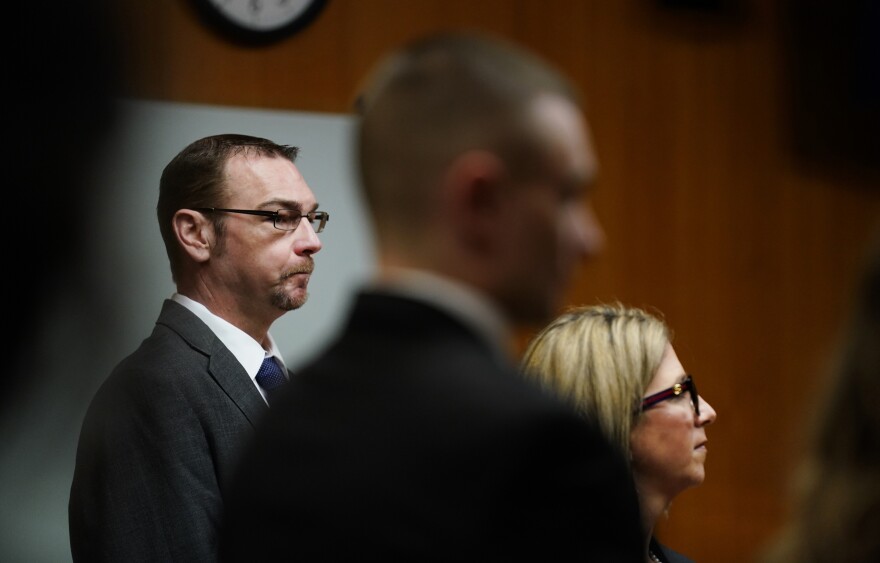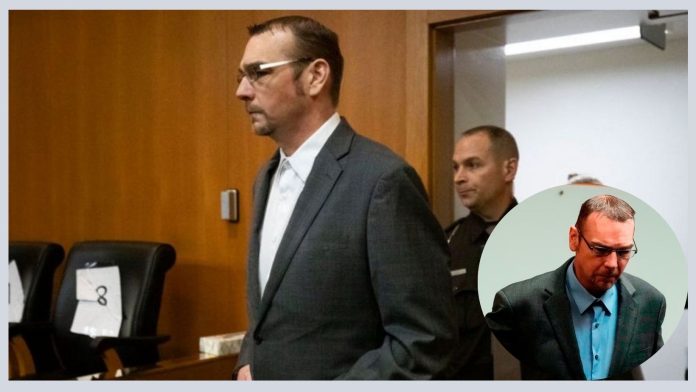Manslaughter Trial of Michigan School Shooter’s Father Concludes with Defense Resting After Single Witness The trial of James Crumbley, father of the teenager responsible for a fatal shooting at a Michigan high school in 2021, wrapped up as the defense rested its case after presenting just one witness.
James Crumbley’s sister, Karen Crumbley, testified, asserting that during her stays with the family in April and June 2021, she did not observe any concerning behavior in Ethan. She also communicated regularly with her brother and mentioned that providing a gun for a child under adult supervision seemed acceptable to her, with no apparent issues.

James Crumbley opted not to testify, informing the court that it was his decision to remain silent before the jury. The trial is currently on a recess, with closing arguments scheduled for 12:30 p.m. ET on Wednesday.
The prosecution, presenting 15 witnesses over the past week, concluded its case by focusing on weapon access and James Crumbley’s response after the shooting. Prosecutors argue that Crumbley demonstrated “gross negligence,” alleging insufficient firearm security and disregard for signs of his son’s declining mental health, contending that the tragedy was preventable and foreseeable.
Defense attorney Mariell Lehman pleads ignorance on behalf of her client, asserting that Crumbley was unaware of his son’s access to the weapon and did not perceive an imminent threat. This defense strategy challenges the boundaries of responsibility in mass shootings, advancing an unconventional legal argument that parents are accountable for such tragedies due to providing a firearm and neglecting signs of mental health issues.
The trial unfolds more than two years after Ethan Crumbley, armed with a SIG Sauer 9mm bought by his father on Black Friday, killed four students and injured six students and a teacher at Oxford High School on November 30, 2021. Ethan Crumbley received a life sentence without parole after pleading guilty to 24 counts, including first-degree premeditated murder and terrorism causing death.
James Crumbley’s case poses a crucial legal precedent, exploring the extent of parental liability in mass shootings. The trial’s outcome will have far-reaching implications for holding parents accountable for their children’s actions, particularly in the context of gun violence and mental health issues.
What Evidence Did The Prosecution Present During The Trial?
Throughout the manslaughter trial of James Crumbley, the father of the teenager responsible for the fatal shooting of four students at his Michigan high school in 2021, the prosecution focused on presenting evidence related to the access to weapons and the circumstances surrounding the shooting. The prosecution’s case centered on the assertion that James Crumbley exhibited “gross negligence,” contending that he failed to secure the firearm properly and overlooked warning signs of his son’s mental health issues.

Critical pieces of evidence included:
- Access to the Firearm: The prosecution emphasized that James Crumbley purchased a SIG Sauer 9mm weapon for his son on Black Friday, which was subsequently used in the shooting. The firearm was allegedly inadequately secured, with no evidence of safety measures to prevent unauthorized access.
- Mental Health Concerns: The prosecution presented evidence highlighting Ethan Crumbley’s mental health problems, such as his expression of suicidal thoughts on social media and interactions with mental health professionals. This evidence aimed to argue that James Crumbley was aware of his son’s mental health issues but failed to take appropriate action.
- Communication and Warning Signs: Witnesses testified about conversations and interactions between James Crumbley and his son, as well as interactions with mental health professionals. This testimony sought to demonstrate that James Crumbley was cognizant of his son’s mental health challenges and the potential risks associated with providing him access to a firearm.
- Reaction to the Shooting: The prosecution introduced evidence of James Crumbley’s response to the shooting, including his initial statements to law enforcement and subsequent actions. This evidence was used to contend that James Crumbley did not promptly secure the scene or take immediate measures to prevent further harm.
The prosecution aimed to establish that James Crumbley had a duty of care toward both his son and the victims of the shooting. They argued that he failed in this duty by neglecting to secure the firearm adequately and address his son’s mental health concerns. The evidence presented during the trial played a crucial role in supporting the prosecution’s claim that James Crumbley’s actions amounted to gross negligence, a pivotal element of the manslaughter charge against him.
Also Read: Trump vs. Biden: 2024 Presidential Rematch Since 1956

